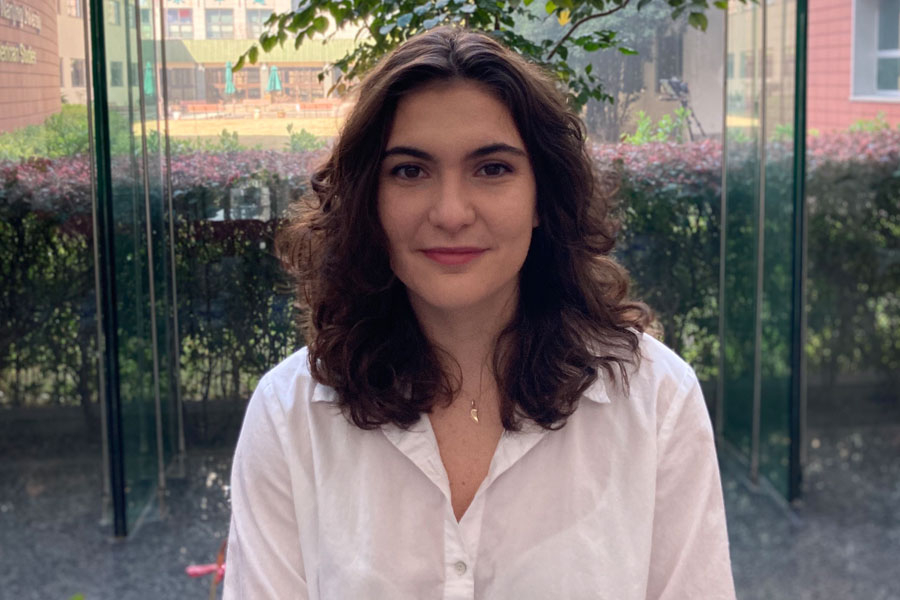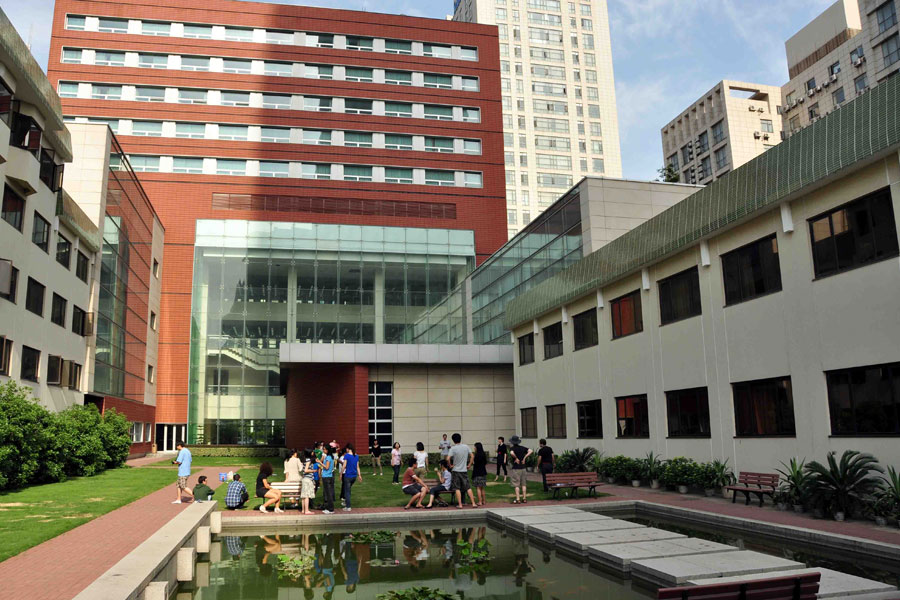Learning in Chinese, Being Taught in Chinese, Living in China

Kalina Pateva
Master of Arts in International Studies

If you are looking to learn more about what it's like to be a current student at Johns Hopkins SAIS, we encourage you to schedule a virtual appointment with one of our Admissions Fellows.
Master of Arts in International Studies
Second-year MAIS student, Kalina Pateva, shares her experiences about being back on campus at the Hopkins-Nanjing Center. Originally from Sofia, Bulgaria and Cleveland, OH, Kalina is a second-year student concentrating in International Politics and Chinese Studies.
Tell us about your background and how you became interested in China.
I was born in Bulgaria and emigrated to the United States when I was 6 years old. I got interested in China during high school, rather accidentally, when we had to pick a foreign language to study. I wasn’t interested in the other options and had heard that the Chinese professor was really good, so I chose Chinese. I started with the intention of studying Chinese for only 2 years, which was the minimum requirement, but I ended up loving it and studying it longer. I then knew that I wanted to do something China-related with my life and career, which is why I chose a degree in Chinese and History.I wanted to get to a level in Chinese where I could lead conversations and form opinions about world events and international relations in Chinese, instead of from an outsider perspective.
What encouraged you to apply to the Hopkins-Nanjing Center?
My flat mate at the time had found out about the HNC while we were both looking at post-graduate options. What struck me about the program is that it is entirely taught in Chinese, which was very appealing because most undergraduate degrees, like the one I was pursuing, were not geared toward people that had previously studied Chinese, but rather towards beginners. I wanted to get to a level in Chinese where I could lead conversations and form opinions about world events and international relations in Chinese, instead of from an outsider perspective. Learning in Chinese is a perfect way to understand the other side’s perspectives and thoughts, and how China makes decisions in politics and governance. The prospect of writing a thesis in Mandarin also encouraged me to apply. The HNC really stood out as offering the only program at such a high level and at such a prestigious university that gives the option of learning in Chinese, being taught in Chinese and living in China.
The Hopkins-Nanjing Center
What has it been like to be on campus, living in the dorms?
Living on campus has been fantastic. I am so happy to be here, especially after having experienced doing this degree in my home in Bulgaria, then in Cleveland, and afterwards in Taipei. Being on campus makes a huge difference in how I interact with my fellow HNC Chinese classmates. Even from my first day being in Nanjing I had already made a lot of friends, it felt like walking straight into a community that you are automatically accepted into, which we could not get online. Since then, I have also had many opportunities for eye-opening conversations on the Chinese perspective. Being in person, you get to have face-to-face conversations about certain topics that wouldn’t necessarily be openly discussed in online classes or in a WeChat group. I think that these interactions are part of the more unique experiences the HNC offers.How was your experience adjusting to the Chinese coursework? Do you have any tips for future students?
Adjusting to the coursework during my first year was quite difficult, because I had only ever studied Chinese as a language, but not content in Chinese. I think there is a big transition to reading and digesting academic material in Chinese. It was extremely tough and time-consuming at first, because I was really slow, but by the end of the semester I was reading a lot faster and understanding a lot more. As a tip, I would recommend pushing through the things you don’t necessarily know and trust that eventually you will know them. It’s ultimately more important to finish a reading than to start one and get caught on every single word you don’t know. Another tip I would give is about writing academic Chinese. I would recommend taking full advantage of the student peer revision groups to have your essays edited. However, rather than simply accepting all the edits just to meet a deadline, it is very helpful to going through the edits, look at what the Chinese students are changing and why. You can then go back to these edits before the next essay, to see where you have been making mistakes and try to not repeat them.What are you most passionate about and what do you plan to use your degree to achieve?
I am passionate about understanding, and fostering understanding between people, cultures, and situations. I really value the ability to approach situations without judgement and with an open mind that recognizes different perspectives, which is partly why I applied for this degree. Building off that, I am not sure what I will be doing after graduation, but I hope to bring that sort of understanding to my work field. I did an internship in government affairs consulting during the summer, and a lot of that involved bringing understanding about China and Chinese policies to foreign companies. Although some companies might have a different mission, value system or end goal, they can still work with and foster a good partnership with China. I am thinking of going back to that, or working in an international organization that can help foster this kind of understanding between cultures, especially between China, the United States and Europe, and helping all sides understand the others’ perspective.If you are looking to learn more about what it's like to be a current student at Johns Hopkins SAIS, we encourage you to schedule a virtual appointment with one of our Admissions Fellows.
Enjoyed reading Kalina's experience? Learn more about our Master of Arts in International Studies.
Back to Student Stories